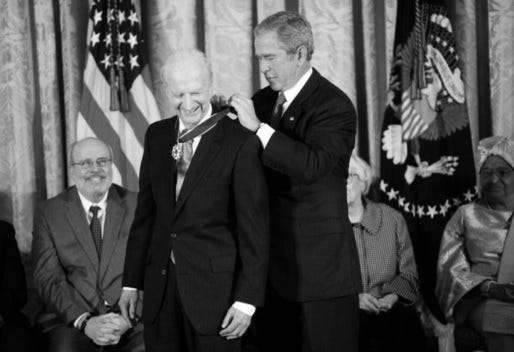Human capital is a troubling idea. ‘If capital exploits labour,’ Becker once asked as he probed his theory, ‘does human capital exploit labour too – in other words, do some workers exploit other workers?’1 Probably. But Becker’s introspection misses a more important question. He neglects to ask whether human capital exploits the ‘ability-machine’ where that capital lives. He fails to see how human capital encourages self-exploitation. How a man like Peterson, an addict of possibility, might subjugate himself with visions of the future.
Byung-Chul Han believes self-exploitation logically follows from human capitalism. Once people become ‘entrepreneurs of themselves,’2 he writes in The Burnout Society, they will voluntarily exploit themselves to maximise performance and profits. At once an asset and operator, a ‘master’ and ‘labouring slave,’ the human capitalist both commands and obeys themselves.3 Today the ‘exploiter is simultaneously the exploited,’ Han writes. Using bleak imagery that alludes to Auschwitz and the gulags he concludes that in the society of human capital, ‘everyone carries a camp inside.’4
A manager-self and a worker-self inhabit the human capitalist. Human capitalism encourages the self to exploit the self; it splits us in two and gives us a psychopathological personality structure. Drawing on psychoanalysis, Han says human capitalism rewrites us as Freudian narcissists, dividing our minds into an ego and ego-ideal. The ego-ideal resembles Peterson’s idea of potential—it is a psychic agent that embodies all we might like to be and invites our love—and within the mind it uses its powers of aggression and seduction to coax the ego into action. The ego-ideal tells the ego—the psyche’s conscious, perceiving agency—to close the gap between what it is and what it could be. Loving the ego-ideal and fearing its wrath, the ego complies and tries to identify with the ideal. It works hard to manifest its potential.5 Split into an ego and ego-ideal by his ideology, the human capitalist is a narcissist at the corporate headquarters. His ego is the worker; the ego-ideal, his manager. The latter dominates and exploits the former who happily and fearfully submits to its injunctions.
Theodore Schultz, another pioneer of human capital theory, once wrote that ‘for man to look upon himself as a capital good… may seem to debase him.’6 [vi] Schultz was correct. As ‘ability-machines’ we have an incentive to live narcissistically. To denigrate ourselves endlessly for our perennial insufficiency. Split into a manager-self and worker-self, an ego-ideal and ego, today’s entrepreneur develops his addiction to possibility; then he exploits himself and reaps the profits and pain from doing so. As work and self-exploitation is eternalised in the world of human capitalism, it isn’t only capital that chases the bourgeoisie to every corner of the globe today. Narcissism now hounds us too. Self-interest marks the limit of our potential. Egotism and the addiction to possibility have become our most sublime experiences.
Footnotes
Human Capital: A Theoretical and Empirical Analysis, with Special Reference to Education, p.16.
The Burnout Society, pp.44 & 49.
The Burnout Society, p.19.
The Burnout Society, pp.19 & 49.
See ‘On Narcissism: An Introduction.’
Schultz, T. (1961) Investment in Human Capital. American Economic Review, 51(1), p.2.





